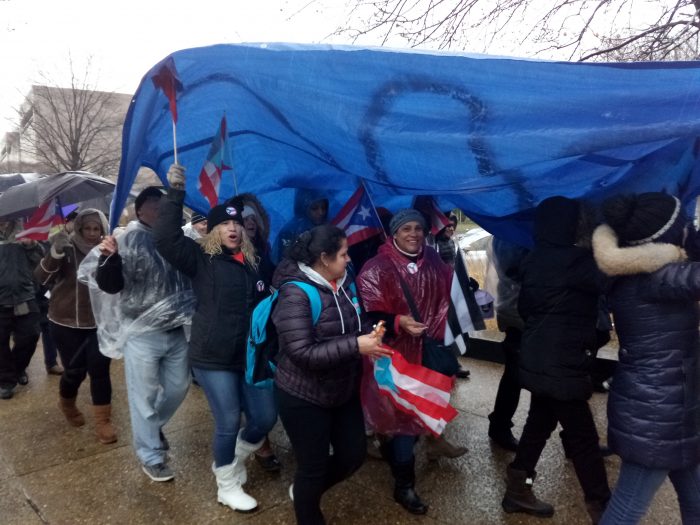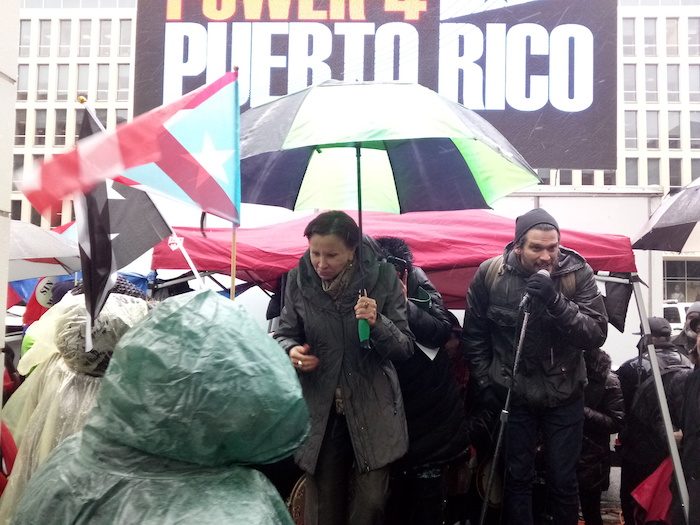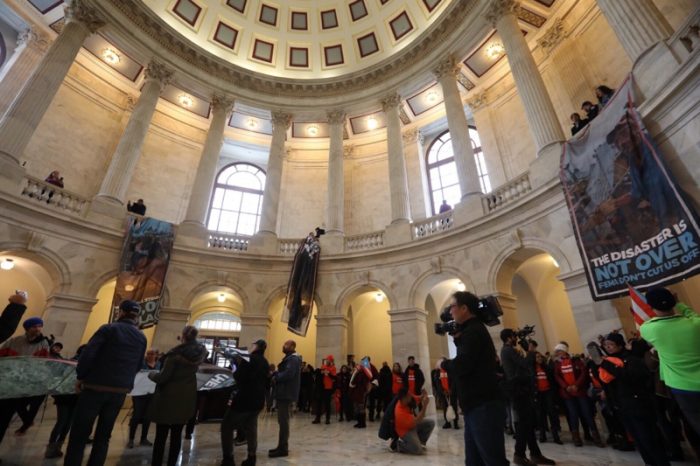WASHINGTON, D.C. — Under a steady, heavy rain reminiscent of the day exactly six months ago when Hurricane Maria slammed into the island of Puerto Rico, several hundred demonstrators gathered in front of the headquarters of the Federal Emergency Management Agency (FEMA) today to express what they called “bitter frustration” with the agency’s response to the storm that devastated the island.
Many of the demonstrators carried blue tarps similar to the ones FEMA distributed to homeowners who suffered damage, only these had “SOS” written in big white letters. Several said they have been frustrated and angered with the agency’s bureaucracy and paperwork in their effort to get aid, including having those seeking help to email or fax documents when there has been no service available to do so.


Demonstrators in Washington, D.C., on March 20, 2018 (Photo by Patricia Guadalupe)
“FEMA denied my request for aid because they said the home didn’t belong to me, that it belonged to my mother. But my mother is deceased and it’s mine now and I’ve sent them all the paperwork to show that but they still denied me,” Lizette Clemente told Latino Rebels. “I’m appealing the decision but it takes 90 days to even hear back from them. It’s very frustrating and I’m here to remind people that there are people in Puerto Rico who need help. We want to tell people to remember us. The new hurricane season is right around the corner and there are still many homes with tarps and you can’t do through a hurricane with a tarp over your house. We need help, and I want FEMA to understand what they’re doing to us.”
Clemente lost her home in the coastal community of Loíza. Since the storm, she has been living with her daughter further inland.
“Right now there’s a great need in Vieques, for instance, where many Americans go on vacation to relax like nothing’s happening, like they forgot about us,” Miguel Acevedo Sierra, a resident of the San Juan suburb of Río Piedras, said. “We are here in Washington demanding that legislators do what they were elected to do and that is help the people.”
More than 121,000 residents are still without power and water service is still erratic is some of the more rural parts of the island, including the mountainous region of Comerío, just 19 miles southwest from San Juan.
“To this day, we still have no electricity and the water comes and goes,” Comerío resident María Ortiz explained. “In my community alone, there are 25 houses without roofs. People think that after six months things are okay in Puerto Rico, but that’s just not reality and that’s why I’m here today. To let people know that we need help and to please pay attention to us.”
Many people still have difficulty getting access to potable water, food and other basic supplies, and to needed medical care.
“These are third world conditions on American soil. This is our nation and these are our people,” said Jaime Contreras, vice president at the Service Employees International Union (SEIU), local 32BJ. “Our federal government has failed Puerto Rico. To date, Congress has not approved a comprehensive relief package that comes near to adequately addressing the estimated $95 billion in damages to the island.”
Rep. Nydia Velázquez (D-NY) has been a long-time critic of the federal response to the hurricane, telling the gathering that “enough is enough.”


Rep. Nydia Velázquez in Washington, D.C., on March 20, 2018 (Photo by Patricia Guadalupe)
“Our message here today is shame! Shame on the federal government for failing fellow citizens in Puerto Rico, and shame on the president for spending his time sending tweets instead of helping the people of Puerto Rico,” Velázquez said. “Mr. President, look at me, we are not giving up, we are here to stay and we are here to fight to bring justice and fairness to our fellow citizens in Puerto Rico.”
To chants of “Puerto Rico no se vende, Puerto Rico se defiende” and “Sí se puede,” the demonstrators marched a mile in the driving rain to the U.S. Senate, where they visited several offices and held a sit-in in the rotunda of one of the buildings, resulting in the arrests of about 25 demonstrators.


Right before about 25 demonstrators were arrested on March 20, 2018 in Washington, D.C. (Photo by Patricia Guadalupe)
Former New York City Council President Melissa Mark-Viverito, a senior advisor to the Latino Victory Fund —a PAC aimed at increasing Latino representation in local, state and federal government— said this is the kind of situation that could have significant electoral repercussions this year during the crucial midterm elections. By one estimate, close to 500,000 residents could relocate to the mainland United States post-hurricane, and as U.S. citizens, they are eligible to vote in stateside elections.
“We have to keep demanding that a change has to happen. We need to get elected officials who care and [put them] in this Congress that right now refuses to act and do what is right. it is about going to the polls,” Mark-Viverito said. And it’s about reminding this administration that they have not done enough for us. There’s still a lot of work to be done and we are angry and upset. We need to agitate and activate and mobilize our community.”
***
Raised in Puerto Rico, Patricia Guadalupe is a bilingual multimedia journalist based in Washington, D.C., covering the capital for both English and Spanish-language media outlets. She tweets from @PatriciagDC.


